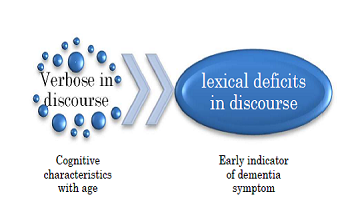
Takako Yoshimura
Kyoto Gakuen University, Japan
Title: The relationship between lexical retrieval in discourse and cognitive functions in dementia - In comparison with the elderly population
Biography
Biography: Takako Yoshimura
Abstract
Objective & Background: The word production or lexical retrieval in discourse would be deteriorated with age, even though cognitions such as confrontation picture naming, memory functions were intact (Yoshimura et al., 2016). Moreover, deficits in lexical retrieval in written discourse were reported to be an early indicator of Alzheimer’s disease better than other cognitive tests such as confrontation picture naming (Pekkala et al., 2013). Purpose our aim is to explore the relationship between the abilities of lexical retrieval in oral discourse and the cognitive dysfunctions in dementia in comparison with the results in elderly. We sought to examine what aspects of cognitive deficits in dementia would cause deteriorated lexical retrieval in discourse, and to know the commonalities and differences between dementia and elderly.
Methods: We studied nineteen demented patients (age: 69-91). Two discourses tasks, Cookie Theft Picture (CTP) from Boston Diagnostic Aphasia Examination (Goodglass & Kaplan, 1983) and False Accusation Picture from Visual Perception Test for Agnosia (Brain Function Test Committee, 1997) were conducted. Additionally, other neuropsychological tests such as, Word Fluency Test (Saito et al., 1992), Rey’s auditory verbal learning test (Rey, 1964) and Frontal Assessment Battery (Dubois et al., 2000) were administered. The results of the elderly were referred to a study of Yoshimura et al. (2016).
Results: The number of content words of each discourse task were analyzed; for dementia 12.7±9.7, for elderly 14.8 ± 5.6 (numbers indicate average and standard deviation). The severer the dementia became, the fewer the nouns in discourse were (p<.01). The relationship between lexical retrieval and cognitive functions were different from that of the elderly.
Conclusion and Significance: We discuss the characteristics of oral discourse in dementia in comparison with elderly. Also, we suggest a discourse task as an efficient tool to evaluate an early stage of dementia in clinical settings.

Figure 1: Lexical retrieval declines were
shown in elderly, but this characteristic would
be an early indicator of dementia.
Recent Publications:
- Brain Function Test Committee (1997) Visual Perceptual Test for Agnosia. Tokyo: Shinko Igaku Suppann-sha. Goodglass H, Kaplan E (1983).
- The Boston Diagnostic Aphasia Examination. Boston: Lea & Febi. Gold D et al (1998).
- Measurement and correlates of verbosity in elderly people. Journal of Gerontology 43(2): 27-33. Pekkala S et al (2013).
- Lexical retrieval in discourse: An early indicator of Alzheimer’s dementia. Clinical linguistics & Phonetics 27(12):905-921. Yoshimura T et al. (2016).
- Word production in discourse and cognitive functions in elderly - the implication for the demented population-. International Psychogeriatric Association Asia Region 2016 Meeting Abstract Book 188-189.

